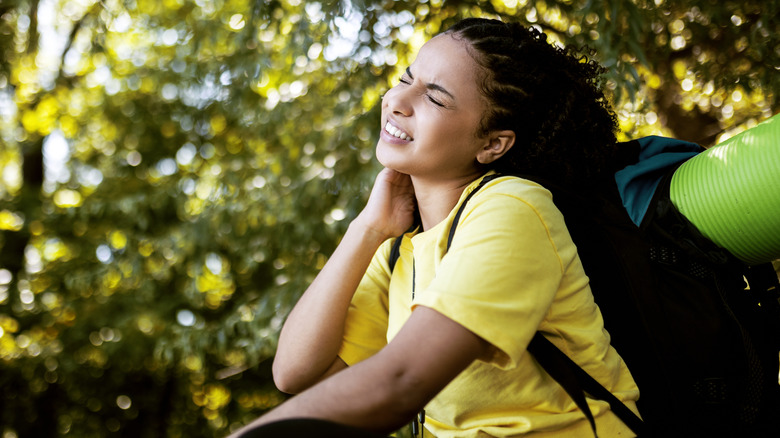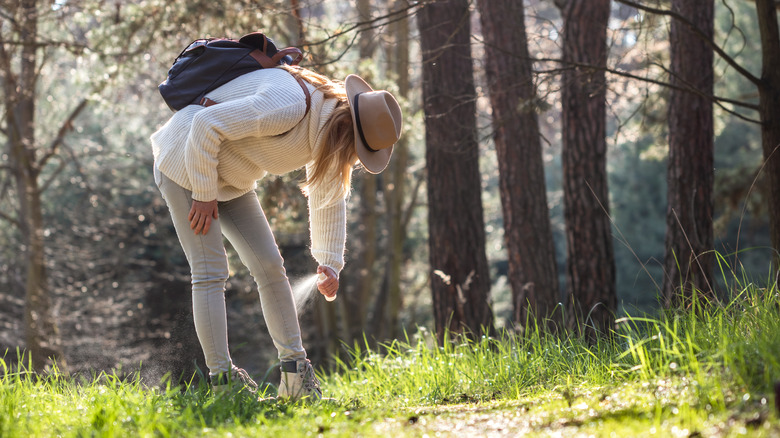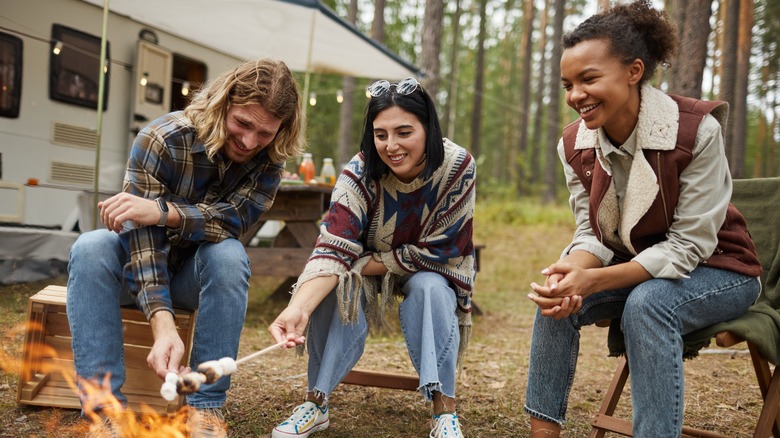Camp In Peace With These Tips For Preventing Mosquito Bites
When summer rolls around, those passionate about the great outdoors often set their sights on camping alongside family and friends. The opportunity to enjoy a scenic campsite can be hard to resist. Camping takes you far from daily demands and immerses you in the best nature has to offer instead.
If you can't wait to spend as much time as possible camping each year, you're in good company. Statista estimates that around 50 million Americans went camping between 2020 and 2021. While camping can certainly be fun, heading into nature in the summer also comes with some risks specific to bug bites. Among the itchiest of issues campers encounter is the mosquito. No less than 175 species of mosquitoes exist in the U.S. alone. Globally, there are more than 3,000 species of mosquitoes to contend with in nature. This can be problematic when you spend a significant time camping.
Unfortunately, mosquito bites are more than a mere nuisance. Bites of this type also come with a risk for diseases, including the West Nile virus, dengue, Zika, and Malaria. The risk of contracting these illnesses makes having strategies in place to prevent mosquito bites while camping an important part of the planning process.
Consider apparel and the scent of products you pack
Packing protective apparel is a good place to start when preventing mosquito bites. It can be tempting to stick with shorts and tank tops as temperatures rise, but exposed skin is extra appealing to mosquitos. Avoiding bites requires some coverage.
Mosquitos often aim for ankles in the summer when sandals are popular accessories. To avoid this, consider wearing closed-toe shoes and socks while camping. If you're going hiking, tuck long pant legs into socks as well. Loose and long-sleeve shirts made of cotton are a comfortable way to keep mosquitos far from your arms and shoulders.
Beyond strategic apparel, preventing mosquito bites requires packing plenty of bug repellent but leaving other topical fragrances behind. Repellents are designed with specific chemicals to deter mosquitos, whereas many lotions, perfumes, hair products, and body washes are created with floral undertones. This can replicate the nectar of flowers, making you an unsuspecting mosquito magnet.
It's a good idea to leave perfumes and scented lotions behind when packing for your camping trip to reduce the likelihood of mosquito bites. If you require extra moisture for your skin in the summertime, a good strategy is to swap out scented varieties of lotions for unscented ones instead. The same goes for topicals like deodorants that often include fragrance and can be an unsuspecting way to draw mosquitos in.
Pick a strategic campsite
Another simple strategy in the fight against mosquito bites while camping is to make sure you're specific when you pick your campsite location. While a spot right by the water with an amazing view is appealing, mosquitos thrive in areas where standing water is prevalent. Picking that lakeside space could mean inadvertently setting yourself up for an itchy experience.
A better solution to keep mosquito bites at a minimum is to focus on a campsite that enjoys a gentle breeze and is sure to get plenty of sunshine after rain. The scent of smoke also deters mosquitos, so setting up camp where you can safely keep a fire going will protect your skin, too. Citronella, peppermint, and cedarwood are scents that deter mosquitoes, so it could be worth your while to pair your bonfire with some scented sprays in these varieties. Adorning your campsite with citronella candles can also keep mosquitos at a safe distance.
Taking some time to consider the time of day you plan your camping activities helps prevent mosquito bites. Mosquito activity is typically highest around dusk, increasing the chances for bites if you're looking forward to roasting marshmallows or taking a sunset stroll. Plan on moving these activities to earlier times to reduce your chances of dealing with a collection of uncomfortable mosquito bites later.


